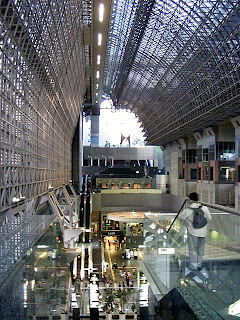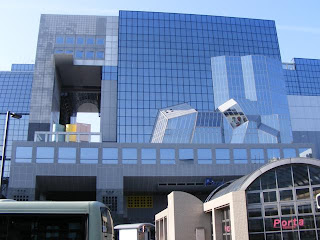I found myself more times and at different hours in the Kyoto Station. This building like a space ship was erected on 1997, at the 1200 th. celebration of Kyoto town. The project belongs to Hiroshi Hara, who offered to this old town a futuristic station, the second in size after that from Nagoya.
The first station was built in Kyoto by decree of the Meiji Emperor on 1874. In 1914 it was replaced by a Rennaisance building which burned out completely on 1950. In 1952 it was replaced by a new station.
This station serves the Tokaido Shinkansen and the trains of JR Company (Japan Rail), as well as those of private companies like Nara Lines or Kintetsu Lines.
A big mall, Porta, and a superstore, Isetan, many restaurants and coffee shops, different small shops can be found here. A set of escalators takes you practically from the street level and carries you up, at the 12th floor were a small garden is arranged and you have a panoramic view(if you do not take into account the not so clean protective glass panels).
Starting from here on, excepting few boulevards which concentrate the commercial life of the town, the rythm of Kyoto is completely different. The town spreads up on the green hills, were temples and sub-temples, unknown for the tourists who come here for one or two days and visit some of the much promoted temples only. I choosed to stay 6 days in Kyoto (to a Tokyo trip prejudice), and visit also some of the less known (at least for the Occidental tourists) temples/sub-temples.
In gara din Kyoto, care seamana cu o imensa nava spatiala, m-am aflat de mai multe ori si la ore diferite in zilele petrecute la Kyoto. Primul contact a fost, desigur, cand am sosit acolo cu Haruka Express, venind de la aeroport. Am recunoscut imagini vazute pe internet si am facut primele fotografii. Agitatie, lume multa, zeci de coridoare ducand in directii necunoscute mie.
Indreptandu-ma spre iesire, pentru a cauta statia de taxiuri, am dat cu ochii de Turnul Kyoto si apoi de un joc de ape, colorat si acompaniat de muzica, privit de oameni cu umbrele care nu se lasau deranjati de ploaie.
Gara, in aceasta forma, a fost inaugurata in 1997, la comemorarea a 1200 de ani ai orasului Kyoto. Ea se datoreaza arhitectului Hiroshi Hara, care a oferit celui mai putin modern dintre orasele japoneze, o gara a viitorului, a doua ca marime in Japonia, dupa cea din Nagoya.
De fapt, prima gara a fost deschisa in 1877, la ordinul imparatului Meiji. Aceasta a fost inlocuita, in 1914, de o cladire in stil Renastere care a ars din temelii in 1950, fiind inlocuita doi ani mai tarziu.
Gara din Kyoto deserveste Shinkansenul Tokaido si trenurile companiei nationale JR (Japan Rail), dar si trenurile unor companii private precum Kintetsu, Nara Line, etc. Interiorul sau imens si subsolul adapostesc mallul Porta, numeroase restaurante si cafenele, mici magazine, supermagazinul Isetan s.a.
Un set de scari rulante te preiau de la nivelul strazii si te urca pana la etajul al 12-lea, unde este amenajata o mica gradina. Prin geamul nu tocmai curat, se pot privi imprejurimile.
Exteriorul garii din beton si sticla ofera aceeasi impresie turistului care soseste la Kyoto si nu se asteapta ca primele cladiri cu care va fi fata in fata sa fie o gara futurista si turnul orasului, atat de atipice pentru acest vechi oras imperial.
De aici incolo insa, exceptand cateva bulevarde cu blocuri mai inalte sau mai putin inalte, mai putin inspirate arhitectural (dupa parerea mea), unde se desfasoara viata comerciala a orasului, restul se risipeste intre dealuri domoale, impadurite, pe care dorm templele si sub-templele refugiate acolo din fata turistilor dezlantuiti. Caci cei care vin in Kyoto pentru o zi sau doua aleg cateva temple dintre cele carora li se face o super-promovare, iar cele mai mici si indepartate, unele dintre ele adevarate bijuterii, le raman necunoscute. In ceea ce ma priveste, am ales sa stau in Kyoto 6 zile (in detrimentul unei vizite la Tokyo) si sa caut si cateva din templele mai putin vizitate sau chiar deloc de catre turistii occidentali.

























welcome back TH. Japan is very high on my bucket list of places to visit. there are so many incredible things to see and experience. thanks for sharing your wonderful journey.
Foarte bine documentat articolul!Fotografiile infatiseaza o lume care noua ne este straina. Ce parvine la noi din acesta lume, nu ne permite sa intelegem cultura est asiatica.Ce faci tu este tocmai ce avem nevoie. Cu respect.
Thank you, Lifa Ramblings! I wish you to go as soon as possible. It is a worth target!
Multumesc mult, Viorel!
Wow! Japan is so modern, the pictures are really beautiful.
Am fost și eu în gara din Kyoto și este impresionantă! Foarte frumoase fotografiile 🙂
Amazing architecture..Hope to visit Japan sometimes soon..
Wonderful collection of modern architecture, so different than your last destination TH! As always your travels are so visually interesting. Thank you for sharing your sights :^)
Thank you, rama! You will see more modern architecture in my future posts about Osaka.
Multumesc, badger! Ti-am citit (si)postarile despre Japonia:)
Thanks, Turquoise Diaries! I keep my fingers crossed that your dream comes true.
Thank you, Doug, for following my stories.
Welcome to Kyoto,Traveling Hawk!
Kyoto station is a familiar sight to us Japanese,but indeed,this building is like a space ship.
Yes,Kyoto station is really modern and refined building,I think.
Japan is a country I would really like to visit…
JAPAN??????????????????????
You are FANTASTIC!!!!!!
Unbelievable!!!!!
To admit, you are the first!!!!!
Your photos are wonderful!!!
Many greetings and kisses
Keep your fingers crossed for me too, I too desire to visit Japan before I leave this world.
Thanks, Kumiko! I still remeber going all the way up to the terrace, and looking down, behind me. It was an overwhelming image.
I believe you, VP!
Thank you, Magda, dear! I am glad you like them.
I will, rama, I will! I wish that everybody could enjoy the wonders of this world.
Wow! Very futuristic architecture.
Yes, you’re right, Rizalenio. Thanks for the visit.
Respect pentru articol si poze !!!!
Mulțumesc!